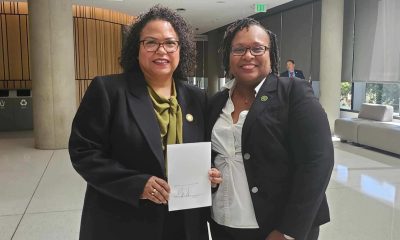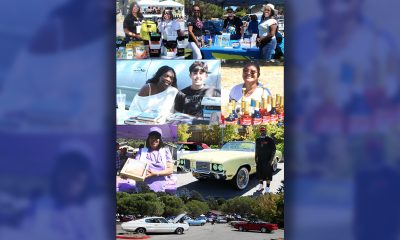Community
How Mobihealth Drives a Telemedicine Revolution in Africa
As a child growing up in northern Nigeria, Dr. Funmi Adewara experienced a severe hand injury that required multiple surgeries and frequent hospital visits. These visits exposed her to the harsh realities of the country’s healthcare system. “I remember sitting in overcrowded waiting rooms, watching doctors stretched thin, unable to meet the needs of so many patients,” Adewara recalls. This formative experience ignited her passion for transforming healthcare in Africa.

By Ifeanyi Abraham
CNN
As a child growing up in northern Nigeria, Dr. Funmi Adewara experienced a severe hand injury that required multiple surgeries and frequent hospital visits.
These visits exposed her to the harsh realities of the country’s healthcare system. “I remember sitting in overcrowded waiting rooms, watching doctors stretched thin, unable to meet the needs of so many patients,” Adewara recalls.
This formative experience ignited her passion for transforming healthcare in Africa.
Growing up with a mother who worked as a nurse, Adewara’s understanding of healthcare challenges deepened through her mother’s stories.
“I knew early on that healthcare wasn’t a privilege — it was a necessity, and I wanted to be part of changing the system,” she explains.
After training as a physician, Adewara worked for 15 years in the United Kingdom’s National Health Service before founding the telemedicine platform Mobihealth in 2017.
Since its launch, Mobihealth has impacted thousands of lives, connecting patients with doctors and healthcare professionals across Nigeria and beyond.
The platform has 20 integrated telehealth clinics that offer remote consultations, diagnostics, and access to specialist care via digital health tools. Located primarily in Nigeria, these clinics are accessible to patients through various subscription plans and are often financed through partnerships with global donor organizations and private donors.
In addition to the clinics, Mobihealth has partnerships with over 200 hospitals, labs, and pharmacies, Adewara says.
The company has earned global recognition, including a $1 million grant from the U.S. Trade and Development Agency in 2022. Adewara was also one of the World Bank’s seven 2020 Sustainable Development Goals & Her award winners, selected from over 2,400 entries worldwide.
Connecting Rural Patients
Across sub-Saharan Africa, millions struggle to access basic healthcare. According to the World Health Organization, the region bears 25% of the global disease burden but has only 3% of the world’s healthcare workers.
“In rural Africa, a trip to the nearest hospital can mean the difference between life and death,” says Adewara.
Mobihealth’s latest initiative offers healthcare for $1 a month for rural and underserved populations. It allows Africans in the diaspora — and global supporters — to sponsor essential services like doctor consultations, diagnostic tests, and access to telemedicine clinics.
The scheme is not solely based on donations; individuals can also subscribe to the service for themselves.
“Healthcare systems across Africa are under immense pressure,” Adewara explains. “Our initiative is a direct response, using technology to connect rural patients with doctors thousands of miles away.”
For Adewara, Mobihealth’s telemedicine platform is not a temporary fix; it represents the future of healthcare in Africa.
“This is about creating a resilient, sustainable and inclusive system, where people, no matter where they are, can access the care they need,” she says.
“Telemedicine brings doctors to people, wherever they may be. By integrating AI and remote monitoring, we are improving the speed and accuracy of care, saving lives in the process,” she adds.
A number of African companies provide telemedicine services, but researchers have pointed out that there are obstacles that could hinder the growth of telemedicine in the continent.
Rural areas can have an unreliable electricity supply and poor internet connectivity, and there is often a lack of government policies and funding around virtual healthcare.
“A Healthcare System for the Future”
Adewara envisions scaling her company’s model to reach millions more across Africa, particularly in countries like Ghana, Kenya, and Ivory Coast.
“Our work is just beginning,” she says. “We are building a healthcare system for the future — one that is resilient, inclusive and capable of meeting Africa’s growing population’s needs.”
However, partnerships are crucial to achieving this vision. “We can’t do this alone. Our collaborations with the African diaspora, hospitals, governments, and international organizations allow us to reach more people and ensure that healthcare is affordable, efficient and accessible,” Adewara adds.
Activism
Essay: A Survivor Relives “The Strike,” a Moving Film Capturing Injustices at Pelican Bay State Prison
It was a privilege to be invited to be part of the panel for the October 9th screening of the documentary “The Strike” at Sonoma State University.
Students from Caitlin Henry’s Criminology and Justice Studies class attended, and their engagement during the event was inspiring.

By Richard “Razor” Johnson
It was a privilege to be invited to be part of the panel for the October 9th screening of the documentary “The Strike” at Sonoma State University.
Students from Caitlin Henry’s Criminology and Justice Studies class attended, and their engagement during the event was inspiring.
After the screening, many students were deeply moved and had the opportunity to ask questions of the Director and Producer, JoeBill Muñoz and Lucas Guilkey, as well as myself, Richard Johnson, one of the hunger strike survivors and a panel speaker. I was one of the ten plaintiffs against the California Department of Corrections, a case that garnered the attention of the United Nations.
Some students lingered after the Q&A, expressing gratitude for raising awareness about the realities faced by those incarcerated. Their emotional responses highlighted the personal connections many have with the prison system, with some sharing experiences of relatives enduring similar conditions. It became clear that there was a significant lack of understanding about the Security Housing Units (SHU) and the stark differences between general population inmates and those confined in Pelican Bay.
On Oct. 23, the Grand Lake Theater will screen “The Strike,” a compelling documentary about Pelican Bay State Prison and the SHU. This film has received numerous accolades, including nominations for “Best Documentary” at the Imagen Awards and the Hot Docs Student Choice Award.
“The Strike” chronicles the harrowing experiences of California men subjected to decades of solitary confinement, culminating in the largest hunger strike in U.S. history. It will also be broadcast nationally on PBS’s Independent Lens in spring 2025.
This documentary is essential viewing, as it critically examines the failures of our judicial system in administering justice and the societal implications of our penal practices. It delves into the psychological torment endured by those held in isolation — many without any rule infractions — and exposes the broader victimization of individuals both inside and outside prison walls.
With over 33,000 inmates participating in the hunger strikes, the film provides an intimate exploration of the power dynamics at play, from the highest levels of state governance to the guards overseeing the units. It reveals the oppressive policies that perpetuate control and abuse within the prison system, ultimately leading to legal interventions to address these injustices.
Don’t miss this powerful documentary that challenges our perceptions of crime and punishment and highlights the resilience of those who fought for justice.
Join us on October 23 at the Grand Lake Theater at 6:30 PM. We will have Q&A at 8:00 PM after the screening with myself and some of the survivors. We look forward to your support and Tickets can be purchased online at www.renaissancerialto.com/TheStrike.php. For more information about the film, visit www.thestrikefilm.com.
Activism
UC Berkeley, Spelman Alum Ruha Benjamin Among 2024 MacArthur ‘Genius’ Award Recipients
The daughter of an African American man and a Persian-Indian woman, Ruha Benjamin is a transdisciplinary scholar and writer illuminating how advances in science, medicine, and technology reflect and reproduce social inequality. By integrating critical analysis of innovation with attentiveness to the potential for positive change, Benjamin demonstrates the importance of imagination and grassroots activism in shaping social policies and cultural practices.
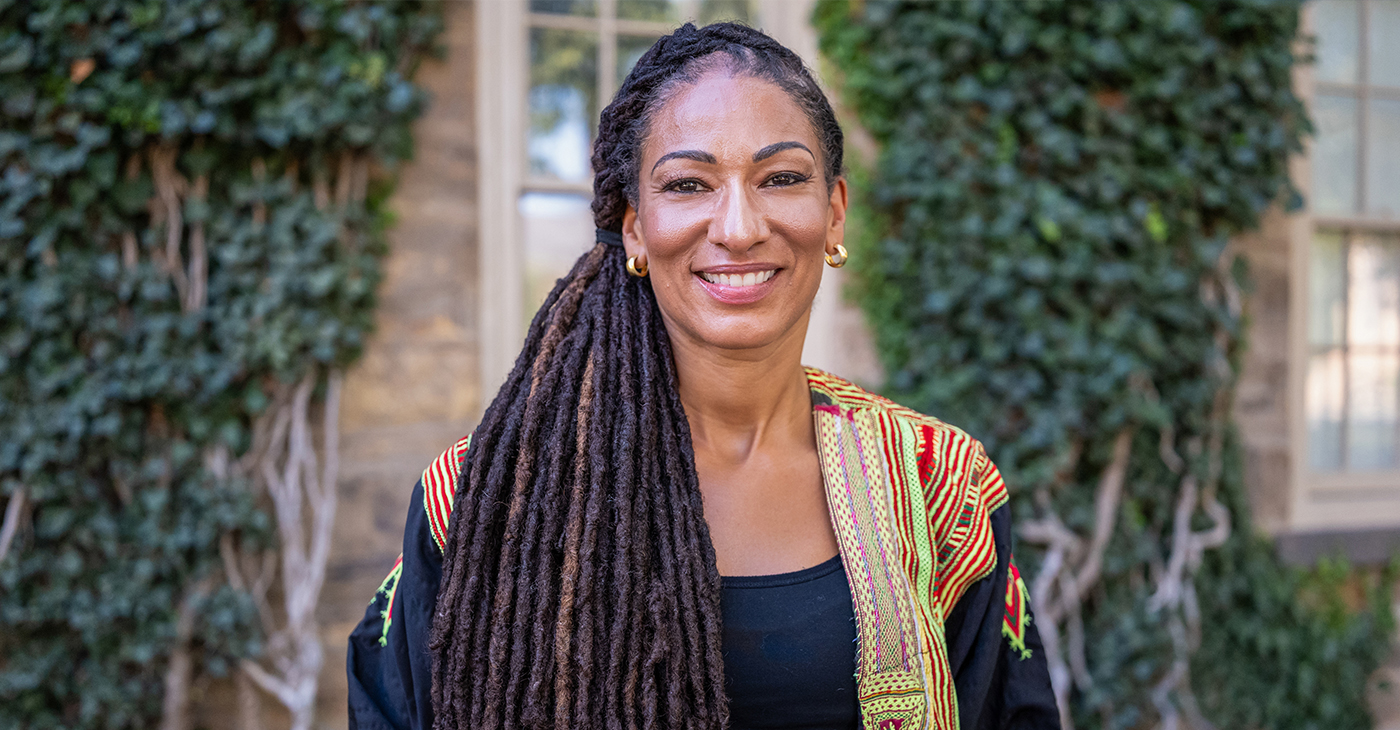
When grants were announced earlier this month, it was noted that seven of the 22 fellows were African American. Among them are scholars, visual and media artists a poet/writer, historian, and dancer/choreographer. The awardees receive $800,000 over a five-year period. The Post will publish their innovations over the next several weeks, starting with Ruha Benjamin, who received her PhD in Sociology at UC Berkeley.
Ruha Benjamin
The daughter of an African American man and a Persian-Indian woman, Ruha Benjamin is a transdisciplinary scholar and writer illuminating how advances in science, medicine, and technology reflect and reproduce social inequality. By integrating critical analysis of innovation with attentiveness to the potential for positive change, Benjamin demonstrates the importance of imagination and grassroots activism in shaping social policies and cultural practices.
Benjamin shares the inspiration behind her work on her website: “I write, teach, and speak widely about the relationship between innovation and inequity, knowledge and power, race and citizenship, health and justice.”
“…I arrived here by way of a winding road that has snaked through South Central Los Angeles; Conway, South Carolina; Majuro, South Pacific, and Swaziland, Southern Africa. I come from many Souths, and I tend to bring this perspective, of looking at the world from its underbelly, to my analysis.”
Benjamin’s academic and professional impact is far-reaching. Benjamin served as an assistant professor of sociology at Boston University before joining the faculty at Princeton in 2014. She has since received numerous honors, including the President’s Award for Distinguished Teaching at Princeton and fellowships from the American Council of Learned Societies, the National Science Foundation, and the Ford Foundation. She is also the founding director of the Ida B. Wells JUST Data Lab, a space where students, artists, and activists work together to challenge tech-mediated harms.
In People’s Science: Bodies and Rights on the Stem Cell Frontier (2013), Benjamin examines the persistent gap between those who contribute to new medical technologies and those who actually benefit from them. She uses the California Stem Cell Initiative as a case study to illustrate a persistent problem in medical research: socially marginalized groups engaged for research purposes but not guaranteed access to the treatments that result from that research. Benjamin further investigates the intersection of science and society in Race After Technology: Abolitionist Tools for the New Jim Code (2019). In this work, she exposes the racial hierarchies and systems of social control embedded in seemingly neutral algorithms and automated systems that people interact with daily. These technologies, which rely on biased training data and flawed assumptions, cause direct harm to individuals and communities. Benjamin provides numerous examples of digital systems that perpetuate what she calls the “New Jim Code,” such as marketing algorithms that promote real estate based on “ethnic preferences,” thereby maintaining segregated neighborhoods, and crime prediction software that justifies intrusive surveillance of communities of color.
In her two most recent books, Benjamin weaves together personal experience and social analysis. Viral Justice: How We Grow the World We Want (2022) is a poignant meditation on how individuals drive meaningful social change. She advocates for the power of grassroots initiatives that prioritize care over control, such as doulas focused on birth equity and tenant organizers fighting the legacy of redlining. In Imagination: A Manifesto (2024), Benjamin argues that we are constrained by policies and paradigms that result from the narrow imagination of those who monopolize power and resources and seek to benefit the few at the expense of the many. As founding director of the Ida B. Wells Just Data Lab, she works with students, organizers, and artists to identify, challenge, and transform tech-mediated harms. Benjamin deepens our understanding of the dangers that technological advancements pose to vulnerable populations while reimagining what counts as innovation and who gets to shape our collective future.
Ruha Benjamin received a BA from Spelman College (2001) and an MA (2004) and PhD (2008) from the University of California, Berkeley. She is currently the Alexander Stewart 1886 Professor of African American Studies at Princeton University and the founding director of the Ida B. Wells Just Data Lab (since 2020).
The MacArthur ‘Genius’ Award and the Spelman College web sites are the sources of this report.
Arts and Culture
Soaring Birds and Towering Waves Greet Attendees at 29th Annual Maafa Commemoration at Ocean Beach
The 29th Annual MAAFA Commemoration San Francisco Bay Area was held at Ocean Beach, Sunday, Oct. 13. Warm and cloudy with waves as high as tall buildings, we gathered to honor African ancestors who died by the millions over the centuries of the Trans-Atlantic Slave Trade.

By Wanda Sabir
Special to The Post
The 29th Annual MAAFA Commemoration San Francisco Bay Area was held at Ocean Beach, Sunday, Oct. 13. Warm and cloudy with waves as high as tall buildings, we gathered to honor African ancestors who died by the millions over the centuries of the Trans-Atlantic Slave Trade.
The 50 or so children and adults attending Maafa, Kiswahili word meaning ‘great disaster,’ came from as far as Monterey and Sacramento to just up the block. We all felt the ancestors’ ethereal embrace as Min. Imhotep and Min. Alicia of Wo’Se Community Church poured libations and invited us to call their names with our mouths, feet, and hands.
Birds on the beach lifted their wings in flight moving towards us and flying overhead the way legends say African ancestors flew away from plantation fields. Their collective Aṣé!
The theme for the 29th Maafa event was accountability and as Zochi led us through Mu-i (pronounced moo-ee, a movement meditation) we embraced our power from our roots through our crown chakras. Dr. Uzo Nwankpa, a healer in residence at Freedom Community Clinic, taught us the Igbo war chant —“Eyinmba” which was also an embodied movement.
Our ancestral poet this year was Frances Ellen Watkins Harper (1825-1911), born in Baltimore to free parents. She was a poet, abolitionist, suffragist, educator, and freedom fighter who lived in Philadelphia.
“It’s time to be a grown person,” Wanda Sabir, Maafa CEO stated. “Own up, fess up, get righteous. Accountability means we don’t blame others for our poor choices and their consequences. We don’t blame the system, genetic weakness, structural racism, poverty of the soul, families of origin, peer pressure, ignorance….
“We are more than the worse thing we have suffered. We are more than what our ancestors survived.
“Our ancestors do not want us to be functional. Our ancestors want us to be free.”
The drummers were phenomenal, and the section of the program open to reflections was filled with song, poetry, dance and prayers. A special treat was “Amkara Music” by Karamo Susso and Amina Janta, who will perform at Bissap Baobab in San Francisco on Oct. 20.
Join us for a Zoom dialogue on adrienne maree brown’s article, “Murmations: Love Looks Like Accountability” (Yes! Magazine, 7/25/22): Sunday, Nov. 10, 2-4 pm PT. Register in advance: MaafaSFBayArea.com, 510-397-9705. Here is the MAAFA 2024 program (https://qr1.be/CPFI).
-

 Activism3 weeks ago
Activism3 weeks agoOakland Post: Week of September 25 – October 1, 2024
-
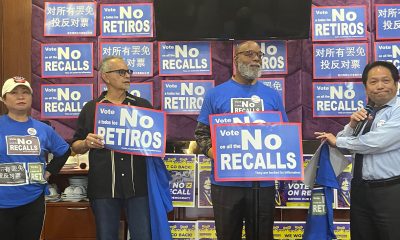
 Activism3 weeks ago
Activism3 weeks ago‘Respect Our Vote’ Mass Meeting Rejects Oakland, Alameda County Recalls
-

 California Black Media3 weeks ago
California Black Media3 weeks agoStudy: UC 4-Year Grad Rate Doubles That of CSU
-
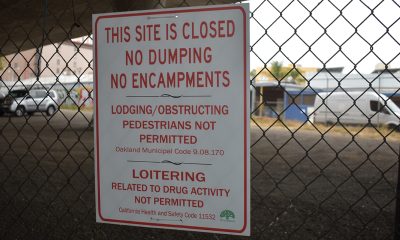
 Bay Area3 weeks ago
Bay Area3 weeks agoMayor Sheng Thao Issues Executive Order to Shut Down Homeless Encampments
-

 Bay Area3 weeks ago
Bay Area3 weeks agoFormer Mayor Willie L. Brown Endorses Dana Lang for BART Board District 7
-
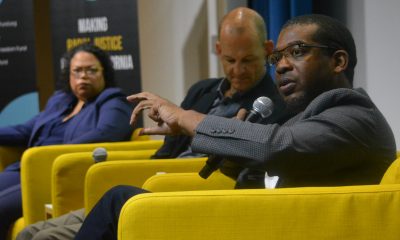
 Bay Area3 weeks ago
Bay Area3 weeks agoState of Black California: Oakland Tour Stop Rescheduled
-

 Alameda County3 weeks ago
Alameda County3 weeks agoAlameda County Democratic Party Opposes the Recall of Mayor Sheng Thao
-

 Business3 weeks ago
Business3 weeks agoGoogle’s New Deal with California Lawmakers and Publishers Will Fund Newsrooms, Explore AI



